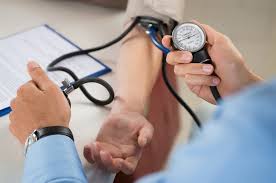Source: nbcnews.com
Almost half of American adults have high blood pressure, or hypertension. It’s often called the “silent killer” because people often don’t have any symptoms and many don’t know they have it.
What is blood pressure?
Blood pressure refers to the force of blood flowing through your blood vessels, according to the American Heart Association. When your heart beats, it pumps blood throughout the body’s blood vessels. As the blood moves through the body, it pushes against the sides of the blood vessels. The force of that push is blood pressure.
Blood pressure is measured with two numbers: systolic pressure (the top number) and diastolic pressure (the bottom number). A blood pressure reading of 120/80 mm Hg means that the systolic pressure is 120 and the diastolic pressure is 80.
Systolic refers to the pressure in a person’s arteries when the heart beats. Diastolic is the pressure in the arteries when the heart is resting between beats.
What is the normal range for blood pressure?
Blood pressure numbers less than 120/80 mm Hg are considered normal, according to the American Heart Association.
Blood pressure numbers from 120 to 129 systolic and less than 80 mm Hg diastolic are considered elevated. People in this range are likely to develop high blood pressure unless steps are taken to control the condition.
What is low blood pressure?
A blood pressure reading of less than 90 systolic or less than 60 mm Hg diastolic is generally considered low blood pressure, according to the Mayo Clinic. Low blood pressure is also referred to as hypotension.
If there are no symptoms, low blood pressure generally isn’t considered dangerous. If symptomatic, low blood pressure can be a sign of a serious medical condition. Symptoms can include:
- Dizziness or lightheadedness
- Fainting
- Blurred vision
- Nausea
- Fatigue
- Lack of concentration
- Cold, clammy pale skin
- Rapid, shallow breathing
Conditions that can cause low blood pressure include pregnancy, heart problems, endocrine problems, dehydration, blood loss, severe infection, severe allergic reaction, and lack of nutrients in your diet.
What is high blood pressure?
Blood pressure above 130/80 mm Hg is considered high blood pressure, or hypertension.
Most of the time, high blood pressure has no obvious symptoms. But left untreated, it can damage the blood vessels. This damage can lead to a range of health problems, including:
- Heart attack
- Stroke
- Heart failure
- Kidney disease or kidney failure
- Vision loss
- Sexual dysfunction
- Chest pain
- Peripheral artery disease
A healthy lifestyle and medications can lower blood pressure. Lifestyle changes include eating a well-balanced diet that’s low in salt, limiting alcohol, exercising regularly, managing stress, maintaining a healthy weight and quitting smoking. If you do take medications to control your blood pressure, make sure to take them properly and work together with your doctor.
How can I lower my blood pressure immediately for a test?
Long-term strategies work best to lower blood pressure, including lifestyle changes.
But there are things you can do in the moment.
Make sure your blood pressure is measured under the right conditions to get the correct reading: You need to be in a quiet room. Don’t smoke, drink caffeinated beverages or exercise within 30 minutes before taking the measurement. Also, empty your bladder and be still for at least five minutes before, the American Heart Association recommends.
Stress hormones constrict blood vessels, raising blood pressure. To help your body relax quickly, practice deep breathing: Sit still with one hand on your stomach and the other over your heart. Inhale slowly until you feel your stomach rise, then hold your breath for a moment. Exhale slowly and feel your stomach fall. Repeat.
Can drinking lots of water lower blood pressure?
Staying well hydrated — preferably with water — helps keep the heart from working too hard, according to the American Heart Association. It allows the heart to more easily pump blood through the blood vessels.
Can aspirin help lower blood pressure?
Avoid a daily aspirin unless your doctor prescribes it, the newest guidelines from the American Heart Association advise. Aspirin can be part of a treatment plan for patients with a history of heart attack or stroke, but its effect on blood pressure is still being studied.
How long does it take to get your blood pressure down?
It depends on the situation. High blood pressure may return to normal quickly after a stressful situation passes. Medications to lower blood pressure can start working on the same day.
It takes about one to three months for regular exercise to have an effect, according to the Mayo Clinic.
